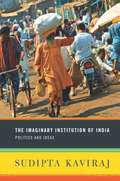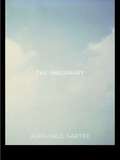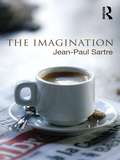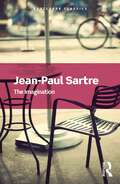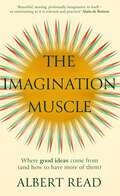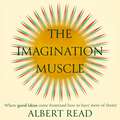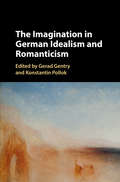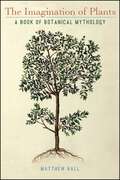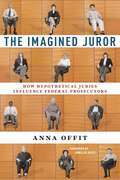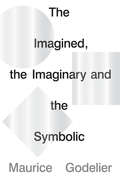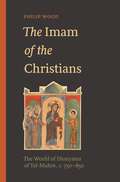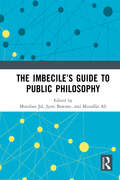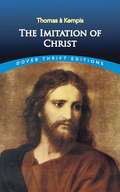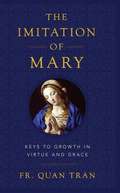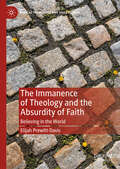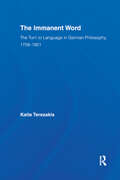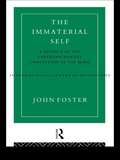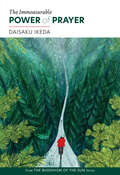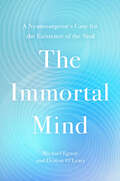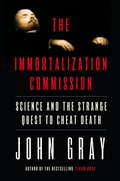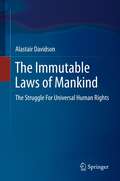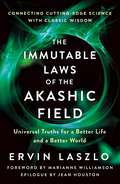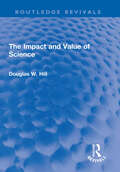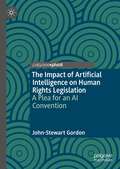- Table View
- List View
The Imaginary Institution of India: Politics and Ideas
by Sudipta KavirajFor decades Sudipta Kaviraj has worked with and improved upon Marxist and subaltern studies, capturing India's social and political life through its diverse history and culture. While this technique has been widely celebrated in his home country, Kaviraj's essays have remained largely scattered abroad. This collection finally presents his work in one convenient volume and, in doing so, reasserts the brilliance of his approach.As evidenced in these essays, Kaviraj's exceptional strategy positions Indian politics within the political philosophy of the West and alongside the perspectives of Indian history and indigenous political thought. Studies include the peculiar nature of Indian democracy; the specific aspects of Jawaharlal Nehru's and Indira Gandhi's regimes; political culture in independent India; the construction of colonial power; the relationship between state, society, and discourse; the structure of nationalist discourse; language and identity formation in Indian contexts; the link between development and democracy, or democratic functioning; and the interaction among religion, politics, and modernity in South Asia. Each of these essays explores the place of politics in the social life of modern India and is powered by the idea that Indian politics is plastic, reflecting and shaping the world in which people live.
The Imaginary: A Phenomenological Psychology of the Imagination (Routledge Classics Ser.)
by Jean-Paul Sartre revised by Elkaim-SartreFirst published in 2004. Routledge is an imprint of Taylor & Francis, an informa company.
The Imagination
by Jean-Paul Sartre‘No matter how long I may look at an image, I shall never find anything in it but what I put there. It is in this fact that we find the distinction between an image and a perception.' - Jean-Paul Sartre L’Imagination was published in 1936 when Jean-Paul Sartre was thirty years old. Long out of print, this is the first English translation in many years. The Imagination is Sartre’s first full philosophical work, presenting some of the basic arguments concerning phenomenology, consciousness and intentionality that were to later appear in his master works and be so influential in the course of twentieth-century philosophy. Sartre begins by criticising philosophical theories of the imagination, particularly those of Descartes, Leibniz and Hume, before establishing his central thesis. Imagination does not involve the perception of ‘mental images’ in any literal sense, Sartre argues, yet reveals some of the fundamental capacities of consciousness. He then reviews psychological theories of the imagination, including a fascinating discussion of the work of Henri Bergson. Sartre argues that the ‘classical conception’ is fundamentally flawed because it begins by conceiving of the imagination as being like perception and then seeks, in vain, to re-establish the difference between the two. Sartre concludes with an important chapter on Husserl’s theory of the imagination which, despite sharing the flaws of earlier approaches, signals a new phenomenological way forward in understanding the imagination. The Imagination is essential reading for anyone interested in the philosophy of Jean-Paul Sartre, phenomenology, and the history of twentieth-century philosophy. This new translation includes a helpful historical and philosophical introduction by Kenneth Williford and David Rudrauf. Also included is Maurice Merleau-Ponty’s important review of L’Imagination upon its publication in French in 1936. Translated by Kenneth Williford and David Rudrauf.
The Imagination (Routledge Classics)
by Jean-Paul Sartre'Every theory of imagination must satisfy two requirements. It must account for the spontaneous discrimination that the mind makes between its images and its perceptions, and it must explain the role that the image plays in the operation of thought. Whatever form it has taken, the classical conception of the image could not fulfil these two essential tasks.' - Jean-Paul SartreJean-Paul Sartre's L’Imagination was published in 1936 when he was thirty years old. The Imagination is Sartre’s first full philosophical work, presenting some of the basic arguments concerning phenomenology, consciousness, and intentionality that were to mark his philosophy as a whole and be so influential in the course of twentieth-century philosophy.Sartre begins by criticizing philosophical theories of the imagination, particularly those of Descartes, Leibniz, and Hume, before establishing his central thesis. Imagination does not involve the perception of ‘mental images’ in any literal sense, Sartre argues, yet reveals some of the fundamental capacities of consciousness. He then reviews psychological theories of the imagination, including a fascinating discussion of the work of Henri Bergson.Sartre argues that the ‘classical conception’ is fundamentally flawed because it begins by conceiving of the imagination as being like perception and then seeks, in vain, to re-establish the difference between the two. Sartre concludes with an important chapter on Husserl’s theory of the imagination which, despite sharing the flaws of earlier approaches, signals a new phenomenological way forward in understanding the imagination.The Imagination is essential reading for anyone interested in the philosophy of Jean-Paul Sartre, phenomenology, and the history of twentieth-century philosophy. The translation has been revised throughout for this Routledge Classics edition. There is also a revised Translators’ Introduction and a new Foreword, both by Kenneth Williford and David Rudrauf. Also included is Maurice Merleau-Ponty’s important review of L’Imagination upon its publication in French in 1936.Translated by Kenneth Williford and David Rudrauf.
The Imagination Muscle
by Albert Read'Beautiful, moving, profoundly imaginative in itself - this book is as entertaining as it is relevant and practical' ALAIN DE BOTTON'Anyone who has an imagination - that is, everyone - should read this book' EDWARD ENNINFUL'An extraordinary book - an elaborate cabinet of curiosities' SPECTATORFor some, the imagination is a luxury in the modern age; something which is by turns elusive, difficult to employ and better left to others. But what is it to imagine exactly? How do we go about it, and why is it so important that we imagine for ourselves?In this insightful and life-affirming book, Albert Read puts the imagination back at the forefront of our lives. Not merely a nebulous concept reserved for artists and creatives, it is a muscle - an essential faculty of the mind to be trained and developed over a lifetime. It is boundless in its potential, infinitely rewarding and central to human achievement.Spanning pre-historic times through to the twenty-first century, The Imagination Muscle explores the genesis of ideas - from Thomas Edison's serial embracing of failure to Jane Jacobs' vision of how we should build cities together; from Steve Jobs' approach to office design to the Japanese concept of Ma. Touching on art, music, film, literature, science and entrepreneurship, this book examines how the imagination has evolved - in shape, power and pace - through the millennia.Albert Read reveals how we can harness the imagination in our day-to-day lives and why, in the new Age of Technology, it is more pressing than ever that we do so. Discover where to find ideas, how to foster skill in observation and connection, and how to be more attentive to the fluxes of our own minds.After all, as Read expertly outlines, the imagination is our supreme gift, our biggest opportunity, our greatest source of fulfilment and our most vital asset for the future.
The Imagination Muscle
by Albert Read'Beautiful, moving, profoundly imaginative in itself - this book is as entertaining as it is relevant and practical' ALAIN DE BOTTON'Anyone who has an imagination - that is, everyone - should read this book' EDWARD ENNINFUL'An extraordinary book - an elaborate cabinet of curiosities' SPECTATORFor some, the imagination is a luxury in the modern age; something which is by turns elusive, difficult to employ and better left to others. But what is it to imagine exactly? How do we go about it, and why is it so important that we imagine for ourselves?In this insightful and life-affirming book, Albert Read puts the imagination back at the forefront of our lives. Not merely a nebulous concept reserved for artists and creatives, it is a muscle - an essential faculty of the mind to be trained and developed over a lifetime. It is boundless in its potential, infinitely rewarding and central to human achievement.Spanning pre-historic times through to the twenty-first century, The Imagination Muscle explores the genesis of ideas - from Thomas Edison's serial embracing of failure to Jane Jacobs' vision of how we should build cities together; from Steve Jobs' approach to office design to the Japanese concept of Ma. Touching on art, music, film, literature, science and entrepreneurship, this book examines how the imagination has evolved - in shape, power and pace - through the millennia.Albert Read reveals how we can harness the imagination in our day-to-day lives and why, in the new Age of Technology, it is more pressing than ever that we do so. Discover where to find ideas, how to foster skill in observation and connection, and how to be more attentive to the fluxes of our own minds.After all, as Read expertly outlines, the imagination is our supreme gift, our biggest opportunity, our greatest source of fulfilment and our most vital asset for the future.
The Imagination Muscle
by Albert Read'Beautiful, moving, profoundly imaginative in itself - this book is as entertaining as it is relevant and practical' ALAIN DE BOTTON'Anyone who has an imagination - that is, everyone - should read this book' EDWARD ENNINFUL'An extraordinary book - an elaborate cabinet of curiosities' SPECTATORFor some, the imagination is a luxury in the modern age; something which is by turns elusive, difficult to employ and better left to others. But what is it to imagine exactly? How do we go about it, and why is it so important that we imagine for ourselves?In this insightful and life-affirming book, Albert Read puts the imagination back at the forefront of our lives. Not merely a nebulous concept reserved for artists and creatives, it is a muscle - an essential faculty of the mind to be trained and developed over a lifetime. It is boundless in its potential, infinitely rewarding and central to human achievement.Spanning pre-historic times through to the twenty-first century, The Imagination Muscle explores the genesis of ideas - from Thomas Edison's serial embracing of failure to Jane Jacobs' vision of how we should build cities together; from Steve Jobs' approach to office design to the Japanese concept of Ma. Touching on art, music, film, literature, science and entrepreneurship, this book examines how the imagination has evolved - in shape, power and pace - through the millennia.Albert Read reveals how we can harness the imagination in our day-to-day lives and why, in the new Age of Technology, it is more pressing than ever that we do so. Discover where to find ideas, how to foster skill in observation and connection, and how to be more attentive to the fluxes of our own minds.After all, as Read expertly outlines, the imagination is our supreme gift, our biggest opportunity, our greatest source of fulfilment and our most vital asset for the future.
The Imagination in German Idealism and Romanticism
by Konstantin Pollok Gerad GentryFor philosophers of German idealism and early German romanticism, the imagination is central to issues ranging from hermeneutics to transcendental logic and from ethics to aesthetics. This volume of new essays brings together, for the first time, comprehensive and critical reflections on the significances of the imagination during this period, with essays on Kant and the imagination, the imagination in post-Kantian German idealism, and the imagination in early German romanticism. The essays explore the many and varied uses of the imagination and discuss whether they form a coherent or shared notion or whether they embody points of philosophical divergence within these traditions. They shed new light on one of the most important and enigmatic aspects of human nature, as understood in the context of a profoundly influential era of western thought.
The Imagination of Plants: A Book of Botanical Mythology (SUNY series on Religion and the Environment)
by Matthew HallPlants have a remarkable mythology dating back thousands of years. From the ancient Greeks to contemporary Indigenous cultures, human beings have told colorful and enriching stories that have presented plants as sensitive, communicative, and intelligent. This book explores the myriad of plant tales from around the world and the groundbreaking ideas that underpin them. Amid the key themes of sentience and kinship, it connects the anemone to the meaning of human life, tree hugging to the sacred basil of India, and plant intelligence with the Finnish epic The Kalevala. Bringing together commentary, original source material, and colorful illustrations, Matthew Hall challenges our perspective on these myths, the plants they feature, and the human beings that narrate them.
The Imagined Juror: How Hypothetical Juries Influence Federal Prosecutors
by Annelise Riles Anna OffitExamines the outsized influence of jurors on prosecutorial discretion Thanks to television and popular media, the jury is deeply embedded in the American public’s imagination of the legal system. For the country’s federal prosecutors, however, jurors have become an increasingly rare sight. Today, in fact, less than 2% of their cases will proceed to an actual jury trial. And yet, when federal prosecutors describe their jobs and what the profession means to them, the jury is a central theme. Anna Offit’s The Imagined Juror examines the counterintuitive importance of jurors in federal prosecutors’ work at a moment when jury trials are statistically in decline. Drawing on extensive field research among federal prosecutors, the book represents “the first ethnographic study of US attorneys,” according to legal scholar Annelise Riles. It describes a world of legal practice in which jurors are frequently summoned—as make-believe audiences for proposed arguments, hypothetical evaluators of evidence, and invented decision-makers who would work together to reach a verdict. Even the question of moving forward with a prosecution often hinges on how federal prosecutors assume a jury will react to elements of the case—an exercise where the perspectives of the public are imagined and incorporated into every stage of trial preparation.Based on these findings, Offit argues that the decreasing number of jury trials at the federal level has not eliminated the influence of the jury but altered it. As imaginary figures, jurors continue to play an important and understudied role in shaping the work and professional identities of federal prosecutors. At the same time, imaginary jurors are not real jurors, and prosecutors at times caricature the public by leaning on stereotypes or preconceived and simplistic ideas about how laypeople think. Imagined jurors, it turns out, are a critical, if flawed, resource for introducing lay perspective into the legal process. As Offit shows, recentering laypeople and achieving the democratic promise of our legal system will require renewed commitment to the jury trial and juries that reflect the diversity of the American public.
The Imagined, the Imaginary and the Symbolic
by Maurice GodelierExploring the close relationship between the real and the symbolic and imaginaryWhat you imagined is not always imaginary, but everything that is imaginary is imagined. It is by imagining that people make the impossible become possible. In mythology or religion, however, those things that are imagined are never experienced as being imaginary by believers. The realm of the imagined is even more real than the real; it is super-real, surreal.Lévi-Strauss held that "the real, the symbolic and the imaginary" are three separate orders. Maurice Godelier demonstrates the contrary: that the real is not separate from the symbolic and the imaginary. For instance, for a portion of humanity, rituals and sacred objects and places attest to the reality and therefore the truth that God, gods or spirits exist. The symbolic enables people to signify what they think and do, encompassing thought, spilling over into the whole body, but also pervading temples, palaces, tools, foods, mountains, the sea, the sky and the earth. It is real.Godelier's book goes to the strategic heart of the social sciences, for to examine the nature and role of the imaginary and the symbolic is also to attempt to account for the basic components of all societies and ultimately of human existence. And these aspects in turn shape our social and personal identity.
The Imam of the Christians: The World of Dionysius of Tel-Mahre, c. 750–850
by Philip WoodHow Christian leaders adapted the governmental practices and political thought of their Muslim rulers in the Abbasid caliphateThe Imam of the Christians examines how Christian leaders adopted and adapted the political practices and ideas of their Muslim rulers between 750 and 850 in the Abbasid caliphate in the Jazira (modern eastern Turkey and northern Syria). Focusing on the writings of Dionysius of Tel-Mahre, the patriarch of the Jacobite church, Philip Wood describes how this encounter produced an Islamicate Christianity that differed from the Christianities of Byzantium and western Europe in far more than just theology. In doing so, Wood opens a new window on the world of early Islam and Muslims’ interactions with other religious communities.Wood shows how Dionysius and other Christian clerics, by forging close ties with Muslim elites, were able to command greater power over their coreligionists, such as the right to issue canons regulating the lives of lay people, gather tithes, and use state troops to arrest opponents. In his writings, Dionysius advertises his ease in the courts of ʿAbd Allah ibn Tahir in Raqqa and the caliph al-Ma’mun in Baghdad, presenting himself as an effective advocate for the interests of his fellow Christians because of his knowledge of Arabic and his ability to redeploy Islamic ideas to his own advantage. Strikingly, Dionysius even claims that, like al-Ma’mun, he is an imam since he leads his people in prayer and rules them by popular consent.A wide-ranging examination of Middle Eastern Christian life during a critical period in the development of Islam, The Imam of the Christians is also a case study of the surprising workings of cultural and religious adaptation.
The Imbecile’s Guide to Public Philosophy
by Murzban JalThis book studies the role of serious philosophizing in everyday life and looks at how authoritarianism negates philosophical and public reason. It sheds light on how philosophy can go beyond its life as a discipline limited to an esoteric group of academia to manifest itself via radical discursive practices in public life which enable us to understand and resolve contemporary socio-political challenges. It studies philosophy as a discipline which deals with one's orientations based on experience, the logic of reasoning, critical thinking, and most of all radical and progressive beliefs. The book argues that the contemporary rise of capitalism in modern society, resonating Émile Durkheim’s cautions on "anomie", has favoured individualism, differentiation, marginalization, and exploitation, balanced on an eroding collective consciousness and a steady disintegration of humanity and reason. Taking this into consideration, it discusses how philosophy, both mainstream and marginal, can revive democracy in society which then is able to confront global authoritarianism led by the figure of the imbecile. Finally, it also provides a range of new perspectives on the questions of civic freedom, hegemony of language, social justice, identity, invisible paradigms, gender justice, democracy, multiculturalism, and decolonization. This book is an invigorating compilation of essays from diverse disciplines, engaging the need to create a humanistic public philosophy to transcend the state of imbecility. It will be of great interest to students, scholars and researchers of philosophy, contemporary politics, history, and sociology, as well as general readers.
The Imitation of Christ (Dover Thrift Editions Ser.)
by Thomas À Kempis Harold Bolton Aloysius CroftThis classic of Christian devotional literature has brought understanding and comfort to millions for centuries. Both Protestants and Catholics — as well as mystics and historians of religious thought — have studied these meditations on the life and teachings of Jesus, finding in them a path to prayer and spiritual guidance. Written in a candid and conversational style, The Imitation of Christ discusses liberation from worldly inclinations, recollection as a preparation for prayer, the consolations of prayer, and the place of eucharistic communion in a devout life. With its simple, readable text, this translation will appeal to new readers as well as to those already familiar with this religious classic.
The Imitation of Mary: How to Grow in Virtue and Merit God's Grace
by Quan D. TranIn this book, the author shows how to imitate the twelve essential qualities of Mary in order to unleash a torrent of graces in life. He explains that, like any gift, grace must be received, opened, and used. As you learn how, you'll begin to acquire the temperaments, dispositions, and qualities that are most pleasing to God, and you'll serve as a channel of God's grace for others.
The Immanence of Theology and the Absurdity of Faith: Believing in the World (Radical Theologies and Philosophies)
by Elijah Prewitt-DavisThe constant inundation of the affect and information experienced by contemporary individuals exposes the tragic nature of the world, making nihilism an epistemologically reasonable response. To counter the threat of nihilism, Elijiah Prewitt-Davis argues that knowledge must be replaced by belief. Against the common protestant concept of belief as strictly personal and interior, he proposes believing in the world as an absurd and immanent faith in the impossible—a belief that allows one to see and feel the potentialities simmering within the world as it is. Following Gilles Deleuze call to “transform belief,” Prewitt-Davis explores how belief heightens an affective attachment to our embeddedness on the world, revealing the potentialities with which time is always pregnant. Believing in the world as it is paradoxically becomes the mode of transforming the world inasmuch as the potential for something impossibly new is always immanently present.
The Immanent Word: The Turn to Language in German Philosophy, 1759-1801
by Katie TerezakisThe Immanent Word establishes that the philosophical study of language inaugurated in the 1759 works of Hamann and Lessing marks a paradigm shift in modern philosophy; it analyzes the transformation of that shift in works of Herder, Kant, Fichte, Novalis and Schlegel. It contends that recent studies of early linguistic philosophy obscure the most relevant commission of its thinkers, arguing against the theological appropriation of Hamann by John Milbank; against the "expressive" appropriation of Hamann and Herder by Christina Lafont and Charles Taylor; and against Philippe Lacoue-Labarthe and Jean-Luc Nancy’s uncritical championing of Schlegel’s ideological position.
The Immaterial Self: A Defence of the Cartesian Dualist Conception of the Mind (International Library of Philosophy)
by John FosterDualism argues that the mind is more than just the brain. It holds that there exists two very different realms, one mental and the other physical. Both are fundamental and one cannot be reduced to the other - there are minds and there is a physical world. This book examines and defends the most famous dualist account of the mind, the cartesian, which attributes the immaterial contents of the mind to an immaterial self.John Foster's new book exposes the inadequacies of the dominant materialist and reductionist accounts of the mind. In doing so he is in radical conflict with the current philosophical establishment. Ambitious and controversial, The Immaterial Self is the most powerful and effective defence of Cartesian dualism since Descartes' own
The Immeasurable Power of Prayer (The Buddhism of the Sun)
by Daisaku IkedaDoes prayer work? What does it mean to pray in Buddhism? In a world where problems, both personal and global, seem out of our control, Buddhist philosopher Daisaku Ikeda explains the power of chanting Nam-myoho-renge-kyo: “ Daimoku is so powerful that there is nowhere in the universe it does not reach.” The Immeasurable Power of Prayer is a collection of essays where Daisaku Ikeda outlines the limitless power of prayer in Nichiren Buddhism. We learn that no matter how difficult our circumstances, through chanting, we develop the ability to take bold action, create value, and make positive changes.
The Immortal Mind: A Neurosurgeon's Case for the Existence of the Soul
by Denyse O'Leary Michael EgnorA neuroscientist and surgeon makes an argument for the existence of a spiritual human soul in this eye-opening book. Many scientists and doctors believe that there is no such thing as the soul. That there is no part of us that persists beyond death. We are not spiritual in any respect. We are made up of cells and tissue, and completely controlled by a material organ in our heads: the brain. In this groundbreaking book, Dr. Michael Egnor makes the case—based on 40 years of practice and over 7,000 brain surgeries—that science has gotten it all wrong. The human brain is incredible, mysterious, and powerful. But it&’s not what makes us who we are. The soul does that. Drawing on the most important research studies in neuroscience, Dr. Egnor presents evidence that the brain alone does not explain the mind. He explores, using modern neuroscience and his vast surgical experience, how inside every damaged brain there is a thinking, feeling person with a spiritual soul that transcends the brain. He also uses fascinating case studies to show how research on conjoined twins who share parts of their brains, on patients in deep coma who are still able to communicate with people around them, on near-death experiences, and on artificial intelligence all make a scientific case for the existence of the spiritual human soul. Engaging, thought-provoking, and groundbreaking, The Immortal Mind shows here that some aspect of who we are is spiritual and immortal, transcending the physical body.
The Immortalization Commission
by John GrayA great philosopher will change the way you think about your life.For most of human history, religion provided a clear explanation of life and death. But in the late 19th and early 20th centuries new ideas -- from psychiatry to evolution to Communist -- seemed to suggest that our fate was now in our own hands. We would ourselves become God.This is the theme of a remarkable new book by one of the world's greatest lving philosophers. It is a brilliant and frightening look at the problems and opportunities of a world coming to grips with humankind's now solitary, unaided place in the universe. Gray takes two major examples: the belief that the science-backed Communism of the new USSR could reshape the planet, and the belief among a group of Edwardian intellectuals -- popularized through mediums and automatic writing -- that there was a non-religious form of life after death.Gray presents an extraordinary cast of philosophers, journalists, politicians, charlatans and mass murderers, all of whom felt driven by a specifically scientific and modern world view. He raises a host of fascinating questions about what it means to be human. The implications of Gray's book will haunt its readers for the rest of their lives.From the Hardcover edition.
The Immutable Laws of Mankind
by Alastair DavidsonThe key question for the history of universal human rights is why it took so long for them to become established as law. The main theme of this book is that the attainment of universal human rights required heroic struggle, first by individuals and then by ever-increasing numbers of people who supported those views against the major historical trends. Universal human rights are won from a hostile majority by outsiders. The chapters in the book describe the milestones in that struggle. The history presented in this book shows that, in most places at most times, even today, for concrete material reasons a great many people oppose the notion that all individuals have equal rights. The dominant history since the 1600s has been that of a mass struggle for the national-democratic state. This book argues that this struggle for national rights has been practically and logically contradictory with the struggle for universal rights. It would only be otherwise if there were free migration and access to citizenship on demand by anybody. This has never been the case. Rather than drawing only on European sources and being limited to major literary figures, this book is written from the Gramscian perspective that ideas mean little until they are taken up as mass ideologies. It draws on sources from Asia and America and on knowledge about mass attitudes, globally and throughout history.
The Immutable Laws of the Akashic Field: Universal Truths for a Better Life and a Better World
by Ervin LaszloConnecting Cutting-Edge Science with Classical WisdomThe Akashic Field is a cosmic field in which all information and knowledge is interconnected and preserved. Our very reality is anchored in this vast sea of connected information that gives rise to everything—from specks of stardust in the outer cosmos to consciousness itself. In The Immutable Laws of the Akashic Field, Dr. Ervin Laszlo, renowned authority in the fields of new science, consciousness, and spirituality, has written an accessible introduction to the mysteries of the Akashic Field, explaining how leading science supports this ancient intuition of the deep reality of the universe. The Immutable Laws of the Akashic Field also features contributions from other leading voices, including Dr. Maria Sagi, Christopher M. Bache, and Kingsley L. Dennis along with a foreword by Marianne Williamson. This approachable text offers a brilliant introduction to and bold affirmation of one of the most profound wonders of our universe.
The Impact and Value of Science (Routledge Revivals)
by Douglas W. HillFirst published in 1945, The Impact and Value of Science is both a plea and a challenge: a plea for more and more science – not to increase the sum total of technical knowledge nor to extend present material amenities, but in the words of the author for the sake of "mental maturity." It is a challenge to try the method of science. Every man is a scientist and every scientist a useful citizen. Dr. Hill has been both an industrial and academic scientist but here he is concerned with something much wider than textbook conception of science. He gives a clear answer to those who argue that scientific progress is leading to man’s destruction by showing that if the scientific method is applied in "non-scientific" fields – in religion, ethics, politics – man will learn how to use the technical inventions of science as stepping stones in social and economic progress. With space tourism and climate crisis marking the two ends of scientific development in current times, this book is of value to everyone but especially to students of climate change, public policy and ethics.
The Impact of Artificial Intelligence on Human Rights Legislation: A Plea for an AI Convention
by John-Stewart GordonThe unmatched technological achievements in artificial intelligence (AI), robotics, computer science, and related fields over the last few decades can be considered a success story. The technological sophistication has been so groundbreaking in various types of applications that many experts believe that we will see, at some point or another, the emergence of general AI (AGI) and, eventually, superintelligence. This book examines the impact of AI on human rights by focusing on potential risks and human rights legislation and proposes creating a Universal Convention for the Rights of AI Systems (AI Convention).
